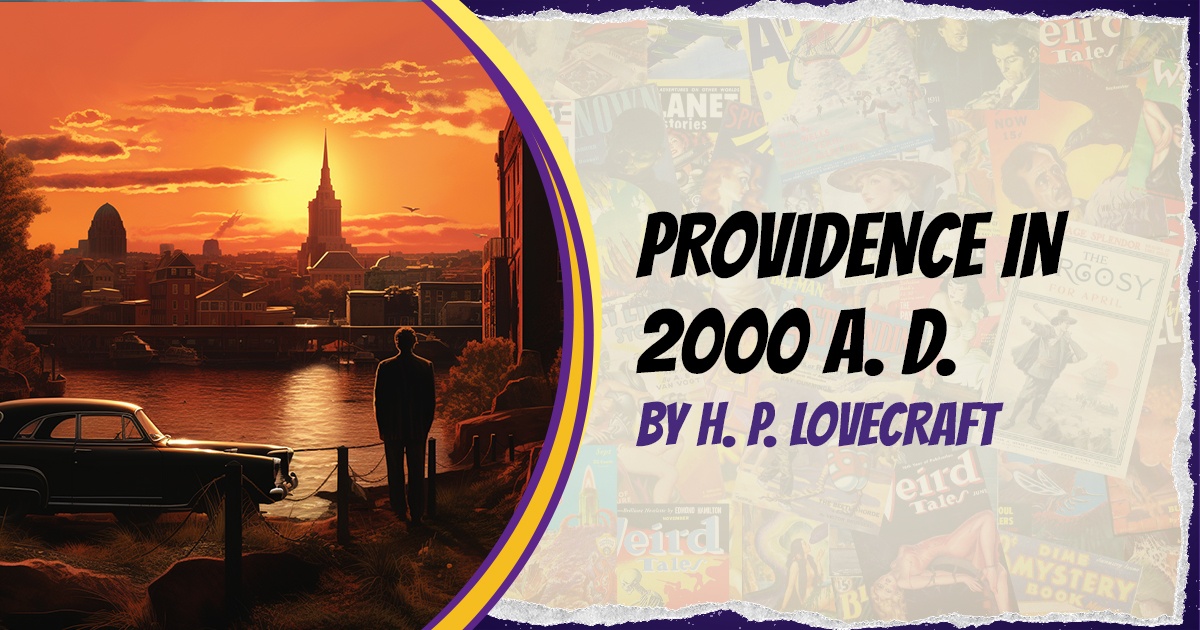Disclaimer: This poem contains highly racist and undesirable views. It is included on this site for documentation purposes only. These views do not represent the views of Pulp University.
Key Details:
- Full Title: “Providence in 2000 A.D.”
- Author: H.P. Lovecraft
- Date of Publication: March 4, 1912
- Length: 28 quatrain verses
- Form: Narrative poem told from a first person perspective
- Setting: The city of Providence, Rhode Island in the year 2000, as imagined by Lovecraft
First published in 1912 (as what was likely Lovecraft’s first published poem), in the Providence Evening Journal, “Providence in 2000 A.D.” depicts the narrator visiting a future Providence that has been culturally transformed by immigrants, much to his unease. Lovecraft shows traces of xenophobia as immigrant groups like Jews are associated with decay, and the Anglo-Saxon narrator feels like a stranger.
Summary:
The speaker has saved up money to visit Providence, Rhode Island, where his ancestors used to live before they were displaced by immigrants and moved to England.
Upon arriving in Providence, the speaker is astonished by how much the city has changed with various immigrant populations. He no longer understands the language, street names have been changed to reflect the new immigrants (e.g. O’Murphy Avenue instead of South Main), and landmarks have been renamed (e.g. Finklestein Crossways instead of Turk’s Head).
As the speaker travels through the city observing these changes, he finally encounters a lone “American” named Smith at the docks. Smith laments being the “Last of my kind, a lone unhappy man” as all the immigrants have taken over Providence and changed its character.
The poem seems to reflect anxiety over the swift cultural and demographic changes in America due to waves of immigration. Through the perspective of the displaced narrator, it portrays a sense of unease and alienation at the forfeiture of traditional American names and culture to new foreign influences.
Full Text
For years I’d sav’d my few and hard-earn’d pence
To cross the seas and visit Providence.
For tho’ by birth an Englishman am I,
My forbears dwelt in undersiz’d R.I.
Until, prest hard by foreign immigrations,
Oblig’d they were to leave the old Plantations,
And seek a life of quiet and repose
On British soil, whence our fam’ly rose.
When on my trip I ventur’d to embark,
I stepp’d aboard a swift and pond’rous ark
Which swimm’d the waves, and in a single day
Attain’d its port in Narragansett Bay.
I left the ship, and with astonish’d eyes
Survey’d a city fill’d with foreign cries.
No word of discourse could I understand,
For English was unknown throughought the land.
I went ashore at Sao Miguel’s Cape,
Where cluster’d men of ev’ry hue and shape.
They say, this place as “Fox Point” once was known,
But negro Bravas have that name o’erthrown.
Upon a shaky street-car, north I flew,
Swift borne along O’Murphy’s Avenue.
Long, long ago, this street was call’d “South Main”,
But such plain titles Erin’s sons disdain.
At Goldstein’s Court I quit the lumb’ring car,
And trod the pave that once was “Market Square”.
At the east end, close by a tow’ring hill,
There stands the ruin of a brick-built pile:
The ancient “Board of Trade”, the people say,
Left from the times before the Hebrew’s sway.
Across a bridge, where fragrant waters run,
I shap’d my journey toward the setting sun.
A curving junction first engag’d my gaze;
My guide-book calls it “Finklestein’s Cross-ways”,
But in a note historical ’tis said,
That the old English nam’d the spot “Turk’s Head”.
A few yards south, I saw a building old;
A stone Post Office, waiting to be sold.
My course now lay along a narrow street,
Up which I tramp’d with sore and weary feet.
Its name is Svenson’s Lane, for by the Swede
“Westminster Street” was alter’d thus to read.
I next climb’d on a car northwestward bound,
And soon ‘mid swarthy men myself I found
On La Collina Federale’s brow,
Near Il Passagio di Colombo.
I then return’d and rode direclty north;
On rusty rails the car humm’d o’er the earth.
Loud near my seat a man in scorn decry’d
And easy plan for reaching the East Side.
Thro’ New Jerusalem we swiftly pass’d;
Beheld the wealth that Israel amass’d,
And quick arriv’d within New Dublin Town,
A city large from small “Pawtucket” grown.
From there I wander’d toward Nouvelle Paris,
Which in the past, “Woonsocket” us’d to be
Before the Gaul from Canada pour’d in
To swell the fact’ries, and increase their din.
Soon I return’d to Providence, and then
Went west to beard the Polack in his den.
At what was once call’d “Olneyville” I saw
A street sign painted: Wsjzxypq$?&%$ ladislaw.
With terror struck, I sought the warf once more,
But as my steamboat’s whistle ‘gan to roar,
A shrivell’d form, half crouching ‘twixt the freight,
Seiz’d on my arm, and halted short my gait.
“Who art though, Sirrah?” I in wonder cry’d;
“A monstrous prodigy,” the fellow sigh’d:
“Last of my kind, a lone unhappy man,
My name is Smith! I’m an American!”

